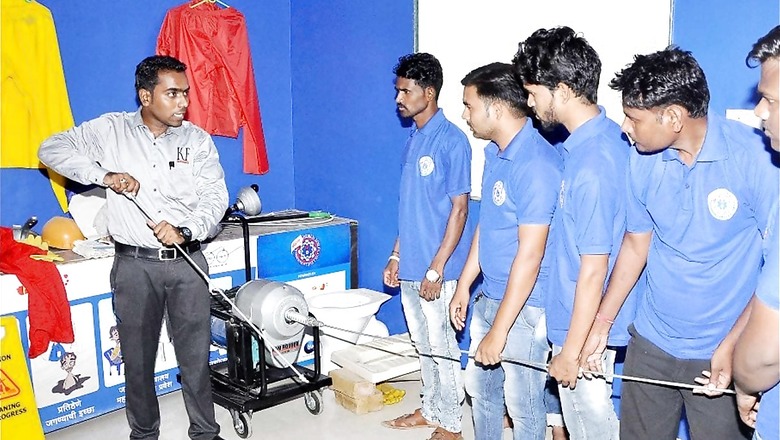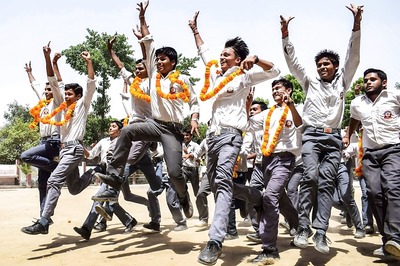
views
When we think about the nation we want to be tomorrow, we think of a $5 Trillion economy, of our UPI platform being used internationally, of having the world’s second largest road network, and how between Mission AYUSH and ABHA, healthcare is set to become ever more accessible to the masses.
In the background of those images our minds conjure, the nation we see is one that gleams: our roads and cities and offices and factories and schools sparkle. Our people look healthy and energised, and by and large, happy and prosperous. The mere fact that we now see this nation as a reality that is firmly within our grasp, has a lot to do with what has come to be known as the world’s largest sanitation programme – the Swachh Bharat Mission.
In the largest programme of this kind, the GoI surpassed all our expectations by making a tangible difference to the quality of life of not just our poorest sections, but everyone else too. There is a marked difference in what our living spaces looked like a mere decade ago, to where we are today – there are toilets for every Indian, at school, at workplaces, at roads, rails and public spaces, and in our homes.
However, the access to toilets alone doesn’t change mindsets. Many Indians, especially in rural areas, see toilets as unnecessary. Changing these mindsets has taken the work of many hands – the GoI, NGOs, social institutions and of course, brands. As India’s leading lavatory care brand, Harpic has been at the forefront of this conversation.
Harpic, together with News18, created the Mission Swachhta aur Paani initiative 3 years ago. It is a movement that upholds the cause of inclusive sanitation where everyone has access to clean toilets. Mission Swachhta aur Paani advocates equality for all genders, abilities, castes and classes and strongly believes that clean toilets are a shared responsibility.
On the occasion of World Health Day, Mission Swachhta aur Paani led a spirited discussion amongst policy makers, activists, actors, celebrities and thought leaders with a panel from News18 and Reckitt’s leadership on the many ways in which poor toilet hygiene and sub-standard sanitation affects us all. In particular, the discussion revolved around Harpic’s very tangible steps towards improving the lives of the vanguard in this fight – our sanitation workers.
Dignity as a human right
Indians often see the work that sanitation workers do as lowly, dirty work. These people are often ostracised, to the extent that people don’t speak to them. They are often forced to live amongst their own communities, and unable to secure education for their children. We no longer call them ‘untouchables’, but in many parts of the nation, we still treat them as so.
Moreover, sanitation workers often work in extremely hazardous conditions. The work is often dangerous – involving workers having to handle human excrement by hand, enter into septic tanks that contain noxious gases that can cause them to lose consciousness. They are also, in general, prone to infections, injuries and diseases that arise from poor (or absent) worker safety policies. Many sanitation workers aren’t even provided basic protective gear like gloves, footwear and masks.
Harpic set up India’s first Toilet College in 2016, with the stated objective of improving the quality of life of manual scavengers through their rehabilitation by linking them with dignified livelihood options. The college operates as a knowledge sharing platform with an aim to uplift the lives of the sanitation workers by educating them about their rights, health hazards, use of technology and alternate livelihood skills. Workers trained by the college are provided placement with various organisations. Following the successful proof of concept in Rishikesh, World Toilet Colleges have opened in Maharashtra, Aurangabad, in partnership with Harpic, Jagran Pehel and Maharashtra Government.
Sanitation work as an essential service
Attitudes towards sanitation workers are finally changing, albeit slowly. PM Narendra Modi sent a strong message to the nation when he washed the feet of five sanitation workers in 2019. Harpic, too, has made significant strides in creating dignity for sanitation workers via the creation of World Toilet Colleges. As Dr Surabhi Singh observed, Harpic’s creation of World Toilet Colleges uplifts the entire profession – no longer is it seen as unskilled, dirty work. It is now seen as a profession that requires specific skills and training; and sanitation workers are seen as trained, skilled professionals performing essential services.
As Saurabh Jain, Regional Marketing Director – Hygiene, Reckitt, South Asia observed, “In India, the worst sufferers in any form of occupation are the people who belong to the lowest economic ladder. It becomes a vicious cycle. When you don’t have the right means, you don’t get proper education, or skill sets, and you don’t get absorbed into the organised sector, then you have to work in the unorganised sector. And when you look at sanitation as a cycle, you’re absolutely at the bottom of it. So when we looked at it with our partners at Jagaran and World Toilet Organization, we saw an opportunity for us to go in and address it. We’re empowering them with better means of life, with dignity. These are people who are now absorbed in formal sectors. They’re the people who get opportunities in hotels and hospitals. And I think nothing makes Reckitt more proud.”
Sahil Talwar, Director, Jagran Pehel also chimed in with a similar sentiment, “Sanitation workers are the backbone of this system. Their dignity is the cornerstone of the success of the Swachh Bharat Mission and a cleaner society. We are empowering these people to empower ourselves, to solve our problems. It’s not just about getting them better jobs, it is, in fact, very self-serving.”
Breaking the cycle of poverty through education
Padma Shri Usha Chaumar (Former sanitation worker, now President of Sulabh International Social Service Organisation), has witnessed this shift in attitudes firsthand: from being ostracised against, to being recognised as a Swachhta hero who is a regular on panels and discussions on the larger sanitation issues, and policy discussions. Shri Usha’s life has spanned both sides of this spectrum.
Beyond dignity to the sanitation workers themselves, the World Toilet Colleges are also helping uplift the families of sanitation workers too. Ravi Bhatnagar, Director, External Affairs & Partnerships, SOA, Reckitt spoke with pride of the World Toilet Colleges’ latest achievements. “In Patiala, a World Toilet College provided admission to 100 children of sanitation workers in public and private schools, breaking down barriers to education for the children of a community that was once considered untouchable.”
By educating these children, the cycle of poverty that has trapped their families for generations can finally be broken. Many of these children are the first in their families to get an education.
This wasn’t the only positive story covered during the World Health Day event of the Mission Swachhta aur Paani initiative. Join us here, to learn more about the many ways a Swasth Bharat is emerging from a Swachh Bharat.
Read all the Latest News here


















Comments
0 comment